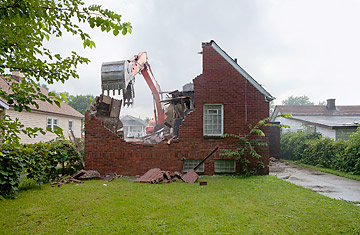
A home being destroyed in the Lee-Miles area of Cleveland
(5 of 5)
The housing crisis presents a good opportunity to rethink homeownership. With rents in many states rising, private investors who think they can make money renting unsold Fannie and Freddie homes have been clamoring for access to them. On Aug. 10, the Treasury Department sent out a notice requesting ideas for just how investors might do that in a way that would reduce the number of unsold foreclosed houses on the market, save taxpayers money on the loan guarantees the federal government has on the homes and improve the properties, among other conditions. Scenarios include outside investors' buying bundles of unsold foreclosed homes, repairing them and renting them out. Alternatively, the government could maintain ownership, sharing the profits with a private investor who manages the property and splitting the equity when the arrangement liquidates. After the program had run for some time, a final decision would be made on what to do with the houses: keep renting them, sell them or tear them down.
By reducing the supply of houses for sale, the program might cut "credit losses and help stabilize neighborhoods and home values," said Edward DeMarco, acting director of the Federal Housing Finance Agency.
4 BACK TO THE BULLDOZERS
The Administration's willingness to consider demolitions as part of the endgame for its rental program suggests that Cleveland's plan to bring in the bulldozers may be ahead of its time. In 2009 Ohio passed a law that enabled the creation of the Cuyahoga Land Reutilization Corp., which can buy up properties for rehabilitation or demolition. The land is then given to neighbors or to churches and other nonprofits for expansions or is used for community gardens.
It's a growth market. There are 15,000 vacant properties in the Cleveland area, with more coming every month as the foreclosure crisis worsens. Foreclosures decrease the value of nearby homes by $7,200 on average, according to the Center for Responsible Lending, and vacant properties discourage potential home buyers and attract crime. "In Cleveland or Detroit or Flint, the volume of abandoned properties is so significant, we are never going to have the stability and predictability housing markets need unless we do something about it," says Frank Alexander, a law professor at Emory University.
There are about 80 land banks around the country, many clustered in Michigan. But a number of states, including New York, have recently passed or are considering laws allowing land-bank development. Ohio's new law eases land banks' ability to seize properties that are delinquent on their taxes. The Cuyahoga County land bank has taken over more than 1,000 properties since 2008 and disposed of about 360 of them since 2010, and its bulldozers are active almost every day now. The private sector is getting involved too. In June, Bank of America, eager to look like part of the solution for once, agreed to give 100 homes to the land bank and pay $7,500 per home toward demolition costs. Other banks — Citigroup, JPMorgan Chase and others — are participating elsewhere.
Feldstein, Zandi, Hubbard and Geanakoplos say that without radical actions like those described above, it will take years for the market to stabilize. The effect of the drag could well be a double-dip recession. That's why the best approach is likely a combination of all of the above policies, boldly pursued. Obama should make Fannie and Freddie offer refinancing-interest reductions for everyone with home loans from the government. He should force principal reductions for those who can still service their government-guaranteed loans. He should encourage speedy evictions for those who will never be able to pay. He should push ahead with plans to rent foreclosed property to provide housing and diminish the supply glut. And for the rest: bring on the bulldozers.
Getting out of the crisis will require one other thing too: perseverance by the millions of Americans who are living with the consequences of decades of crazy lending and borrowing. Jacob Stoll, who grew up in Lakewood, runs the insurance company his grandfather started on Lakewood Avenue and plans to send his two young sons to the same public high school he graduated from, is hanging in there, in part because the city tore down the nuisance property across the street. The police were there twice a day, he says, and he got tired of explaining to his 3-year-old what was going on. "I was about to leave," he says, but now he's decided to stay. "I'm a Lakewood guy. I'm not giving up on this city," he says.
